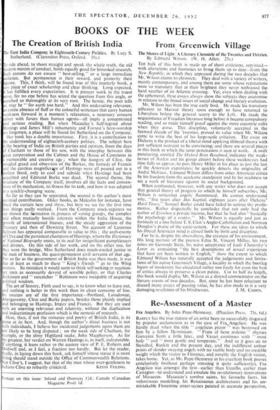BOOKS OF THE WEEK
The Creation of British India
The East India Company in Eighteenth-Century Politics, By Lucy S. Sutherland. (Clarendon Press, Oxford. 35s.) To ride ahead, to shoot straight and speak the whole truth, the old Eastern maxim of conduct, holds equally good for historical research. such canons do not ensure " best-selling," or a large immediate audience. But permanence is their reward, and posterity their
be
legatee. This, I think, will found true of this masterly book, a arc piece of exact scholarship and clear thinking. Long expected, t has fulfilled every expectation. It is pioneer work in the truest sense, for no one before has seized the question from this angle, or searched so thoroughly at its very root. The heroic, the poet tells us, may be " for earth too hard." And this undeviating relevance, an entire absence of fluff or the colourful sentences that carry human weakness forward in a moment's relaxation, a necessary concern rather with forces than human agents—all imply a concentrated and serious reading. But when Macaulay's half-legend about Hastings and James Mill's inhumanity and Forrest's hero-worship are forgotten, a place will be found for Sutherland on the Company.
Her book has a double importance. First, it is a contribution to
the understanding of eighteenth-century politics. The subject here is the bearing of India on British parties and opinion, from the days of Chatham to those of his son, with the interplay between this great corporation and the Cabinet and the House of Commons in a memorable and creative age ; when the hungers of Clive, the mingled greed and obsession of the Burkes, the hatreds of Francis and the careless magnificeape of Hastings were all poured out in a molten flood,, only to coot and subside when Hastings had been acquitted and Edmund Burke was dead. uitted The second theme, the structure of the Company itself, involves all the facts and conven- tions of its mechanism, its fitness for its task, and how it was adapted to a quickly-changing scene.
So far as they can be separated, the second is the author's most
essential contribution. Older books, as Malcolm for instance, have lifted the curtain here and there, but here we see for the first time how things really worked. From the Company stock-registers we are shown the formation in_process of voting groups, the complex and often mutually hostile interests within the India House, the growth of international finance, and the steady aggression of the Treasury and then of Downing Street. No account of Laurence Sulivan has appeared comparable in value to this ; the arch-enemy of Clive and the persistent champion of Hastings, whom the Dictionary of National Biography omits, in its zeal for insignificant pamphleteers and divines. On this side of her work, and on the other too, for they were the bridge, Miss Sutherland does much-needed justice to the men of business, the quasi-permanent civil servants of that age. For so far as the government of British India was then made, it was due at least as much to these " King's friends " as to the Whig orators. So mistaken it would seem to think self-seeking or reaction- ary men as necessarily devoid of sensible policy, or that Charles Jenkinson and " ratcatcher " Robinson were incapable of acquiring political wisdom.
The art of history, Firth used to say, is to know what to leave out,
and nothing is better in this work than its clean economy of line. Its sources are - of the first importance—Portland, Lansdowne, Abergavenny, Clive and Burke papers, besides those plainly implied and belonging to Hastings, Impey and Francis. But they are used with an unerring relevance and relativity, without the duplication and indiscriminate profusion which is the nemesis of research.
Here, then, if not the romance and poetry of British India, is its
prose at its best. And, though the author's direct business is not with individuals, I believe her incidental judgements upon them are not likely to be long disputed ; on the weak side of Chatham, for example, or the slimy Highland snake, John Macpherson. As for the greatest, her verdict on. Warren Hastings is, in itself, indisputable. If anything, it leans rather to the austere view of P. E. Roberts and and, d, as I feel, a fraction too hardly. But let the reader, finally, in laying down this book, ask himself whose statue it is most fitting should stand outside the Office of Commonwealth Relations. Not Clive's, I suggest, but that of the man whose over-gentleness to


























 Previous page
Previous page